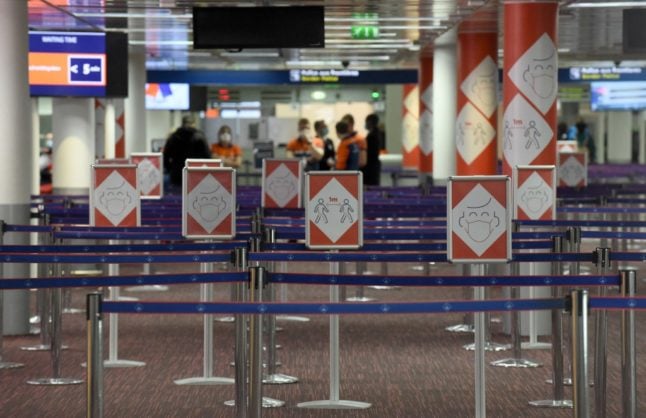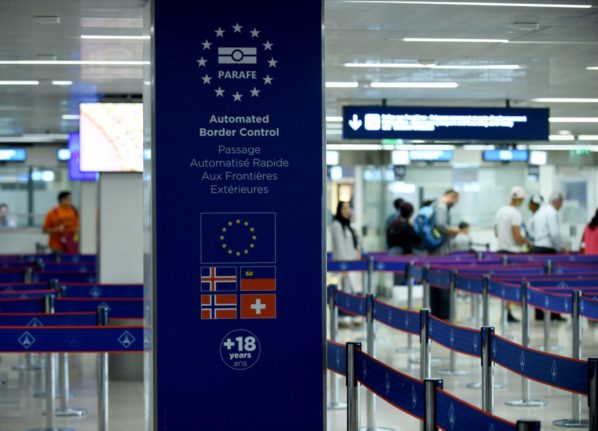The EU Commission president Ursula von der Leyen announced on Monday the bloc’s plan “to revive the tourism industry and rekindle cross-border friendships”.
“We propose to welcome again vaccinated visitors and those from countries with a good health situation. But if variants emerge we have to act fast: we propose an EU emergency brake mechanism,” said Von der Leyen.
The EU is trying to push a coordinated response across the 27 member states to allow for tourist travel from non-EU countries, which was effectively banned in March last year.
However border policy is decided on by each member state and finding common ground in this area has proved difficult.
But there is increasing pressure to open up from certain European countries such as Greece and Spain which depend heavily on tourism.
Time to revive 🇪🇺 tourism industry & for cross-border friendships to rekindle – safely.
We propose to welcome again vaccinated visitors & those from countries with a good health situation.
But if variants emerge we have to act fast: we propose an EU emergency brake mechanism.
— Ursula von der Leyen (@vonderleyen) May 3, 2021
“The Commission proposes to allow entry to the EU for non-essential reasons not only for all persons coming from countries with a good epidemiological situation but also all people who have received the last recommended dose of an EU-authorised vaccine,” said the EU Commission statement on Monday.
The vaccines licensed for use in the EU so far are Pfizer BioNTech, Moderna, AstraZeneca and Johnson & Johnson.
The EU also plans to allow in holidaymakers – even those who are not vaccinated – from countries with low infection rates such as the UK.
The Commission said: “In addition, the Commission proposes to raise, in line with the evolution of the epidemiological situation in the EU, the threshold related to the number of new COVID-19 cases used to determine a list of countries from which all travel should be permitted. This should allow the European Council to expand this list.”
Currently only seven countries are deemed to have low enough infection rates to allow non-essential travel. They are: Australia, New Zealand, Rwanda, Singapore, South Korea, Thailand and China.
The Commission says growing evidence that vaccination helps to break transmission chains supports the argument to reopen borders to tourists from non-EU countries.
Last week the EU parliament backed the Commission’s plan for “EU Covid-19 certificates” that travellers would need to prove they are either fully vaccinated, recovered from Covid and therefore have antibodies or tested negative before travel.
READ ALSO: How will the EU’s ‘Covid passport’ system work for tourists in Europe?
The Commission’s proposal would have to be backed by the European Council and then it will be for member states to implement the measures.
However Brussels remains concerned about the potential for new virus variants to wreak havoc and wants to avoid a situation whereby countries have to re-introduce tight lockdowns due to renewed outbreaks and increased pressure on hospitals.
“The emergence of coronavirus variants of concern calls for continued vigilance,” said the Commission. Brussels says states should be allowed to close their borders to tourists from outside the EU at short notice to stem outbreaks.
“Therefore as counter-balance, the Commission proposes a new ‘emergency brake’ mechanism, to be coordinated at EU level and which would limit the risk of such variants entering the EU. This will allow Member States to act quickly and temporarily limit to a strict minimum all travel from affected countries for the time needed to put in place appropriate sanitary measures.”
This is what the EU Commission proposes:
- Member States should allow travel into the EU of those people who have received, at least 14 days before arrival, the last recommended dose of a vaccine having received marketing authorisation in the EU (Pfizer, Moderna, AstraZeneca, Johnson&Johnson).
- If Member States decide to waive the requirements to present a negative PCR test and/or to undergo quarantine for vaccinated persons on their territory, they should also waive such requirements for vacccinated travellers from outside the EU.
- Member States could consider setting up a portal allowing travellers to ask for the recognition of a vaccination certificate issued by a non-EU country as reliable proof of vaccination.
- Children who are excluded from vaccination should be able to travel with their vaccinated parents if they have a negative PCR COVID-19 test taken at the earliest 72 hours before arrival area.
Several EU member states have already announced their own plans for reopening, including France which proposes allowing all vaccinated tourists from outside the EU from June 9th, and Spain which is talking to the UK government directly about access for British tourists this summer.



 Please whitelist us to continue reading.
Please whitelist us to continue reading.
This is tremendous news for British who have family resident in Sweden . Everyone in UK over the age of 40 has now received 2 shots of the vaccine , and Covid cases in UK are now close to zero.
That’s some rose-tinted glasses you are wearing, “Billy”.
Yesterday’s cases: 1671, two doses given to 22,9% of population (people 40+ are 50% of population).
Much better than Europe, but let’s not overstate it.
The issue here, I’m afraid, is not who the EU will let in but who will want to come. Apart from the fact that ,say in the case of France, Brits would have to book their holidays whilst all the restaurants , bars etc are still closed, it’s very unlikely that any EU country – other than maybe Malta – will be on the UK green list. That means two-weeks holiday in France will cost every Brit tourist 2 weeks quarantine when they get back to Britain. That isn’t going to happen is it ? I understand the EU wanting to open up but really it’s premature and a decision not driven by the data but the economics of not wishing to lose another tourist season.
You aren’t wrong, but my parents want to come see me anyways. We can still see things outdoors and order food for take out. Currently, despite being fully vaccinated since February, my parents have been unable to come visit me in Germany.
All vaccinations approved by WHO should be allowed and not just the 3 that EU has approved. It’s sad to see that even in these times of peril Russia, Eu and China have horns locked over vaccine approvals
We have rescheduled our daughter’s wedding for June 15 in Italy. Was supposed to have been in May 2020.
Everyone in our group has been vaccinated, just waiting on pins and needles to see if they will let us in.
Vaccination cards, app or whatever they want, just wish we could hear something somewhat definitive.
US citizens get only a paper CDC card, which is so easily forged that fake cards are currently being sold by scammers. So which EU country wants to be the first to say they’ll accept this as proof of vaccination? Anyone? Anyone? Buehler?
Buehler? 😂 Perfect!
Since only 20% of EU citizens have been vaccinated, it’s really the tourists that need protecting from the locals rather than the other way round – specially those from the US and UK.
True. I got my first shot yesterday. I’ll be “fully vaccinated” 6/18. I live in Germany, but I’m an American. My parents would love to come see me. They have been fully vaccinated since February. We do just have the cards. Still, everything has been honor system until now. UK and US citizens should be trusted. I know someone who came from Kenya and simply bought a fake test cert to come into Austria. They were never tested. If Germany (EU) is allowing that, surely the white card with name, vaccine type, batch, and date is good enough.
“US and UK citizens should be trusted” ummm why? Everybody with a valid vaccination certificate should be trusted darling, not only white people. A lot of people who live in Kenya are escaping terror and death, that is not lesser important to mommy and daddy visiting.
Wow. I’m not white, but the person I know coming from Kenya to Austria was white. You seem to have a lot of racism burning in your blood. Which countries are to be given greater trust has nothing to do with race, but rather, integrity with respect to government officials taking bribes and the prolific nature of fake documents. Obviously, most developed countries can be trusted and most developing countries should follow the “trust but verify” policy. I added the UK and the US because a. this paper is in English b. more than half of adults in those countries are vaccinated c. some nations have no restrictions coming to EU so I didn’t need to mention them. I should have added Israel and the UAE too. As far as those escaping war being more valuable than legal residents having parents visit, that isn’t really a topic for this article, but rather one of if the EU needs more refugees. I’m going to guess that’s an emphatic no from most people living and working in the EU.
Terror and death????? Are talking about kenya ?or you mean Somalia?, Learn your history well n stop fake stories before talking nonsense!, kenya is heaven, one of the most comfortable place to live in africa!Do your research!
lies!, which fake tests it is here where people are dieing not kenya , shame on you tanishing africa even when its so obvious , there is not much corona there, some of you whiter than snow wanna connect africa with corona! Shame!!!!
lies!, which fake tests it is here where people are dieing not kenya , shame on you tanishing africa even when its so obvious , there is not much corona there, some of you whiter than snow wanna connect africa with corona! Shame!!!!
The big question is, when will the Italian government recognise there are people living in Italy who are not registered with the health service and therefore unable to have a vaccination? It needs to be a vaccination for all persons living in the country not just for those with the health card. Until they “wake up” to the situation they will never go near eradication of the disease.
Since when does Sweden coerce people into taking experimental vaccines? Didnt they ban that sort of thing at the Nuremberg Trials? My body, my choice yes? Just test the people as they arrive, and charge them 500kr for it soo my tax money doesnt have to pay for it. No Covid=no problem.
As for ‘Protecting’ people, most people do absolutely nothing to protect themself! Eat and drink what ever they want, dont excerise, dont take suppliments to improve there immune system and now i have to protect them by taking an experiemntal vaccine! no thanks.
To me the great issue here is only accepting vaccines approved by the EU and not all vaccines approved by the WHO. I come from South America and most countries here are vaccinated with Sinovac which is chinese but approved by the world health organization. If they don’t add these other approved vaccines to the list then Europe will lose a huge portion of tourists and then again they would discriminating greatly.
Another thing to add is that for example in my home country we have 85 days till mass country immunity, that is less than half the time needed compared to European countries. Its tourists that need protections from Europeans not the other way around.